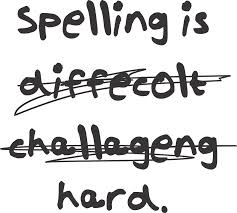English is Easier to Spell Than You Think. (Really?)
 |
| http://anglozine.com |
Probably every writer of English struggles with spelling and word form. There, their and they're is one nightmarish trap that so many writers fall prey to.
When you ponder the amazing history of our language, you'll realize that we struggle with an olio of Celtic, German, Scandinavian, Pig Latin, French, Hindi, Vietnamese, Arabic, Swahili, Amharic, Martian, Valley Girl, Welsh, Scottish, Irish, Yiddish, vague and rare crossword and scrabble words, all tossed with a smattering of guttural grunts and squeaks, held loosely together with a Latin grammar that has absolutely nothing to do with the structure of English. Thank God that clicks and pops are more or less out of vogue.
If you think I'm kidding, just watch this wonderful series on the History of English. The origination of the word "shit" is especially illuminating.No wonder spelling is in the eye of the beholder. Don't get me started on grammar.
Early on in my writing career I read something that has stuck with me since. Don't remember the source, but it sure rings true. Most writers of English habitually misspell about 100 words, in my case, give or take about a thousand or so.
Of especial frustration is the rule, "i before e except when I use it." I hate this rule. I never get it right.
My spelling can be so bad that my computer crashes and refuses to reboot unless I promise to stop trying to sound literate.
Sigh.
Well, wouldn't you know several researchers have the temerity to claim that English spelling has some sort of underlying logic. I have to believe them. I didn't spot a single questionable spelling in their entire article. So they must have the inside dope.
Here's the story with a link to the original.
* * * * *
The hazards of English spelling:
New findings make it less hazardous
than previously thought
A new study of English spelling practices demonstrates that the way we spell words is much more orderly and self-organizing than previously thought. Their research examines previously unnoticed systematic aspects of English spelling and explains how the system emerged.
-ous
One suffix that the authors report on is -ous, found in words like nervous and hazardous, which turns nouns like nerve and hazard into adjectives. They discovered that the final letter sequence ous may serve as a flag, informing readers that a word must be an adjective. The sound of this suffix is a short vowel (linguists call it schwa) followed by s: ?s. The authors found that any written English word that ends in the three letter ous is an adjective and conversely that a word that that ends in the sound ?s but is not an adjective is never spelled with ous: service, genius, menace. They also have found similar patterns for other adjective suffixes, including the -ic of allergic, the -al of final, and the -y of funny.
For each of these affixes, the authors analyzed a large sample of written English documents dating back close to a thousand years. For every word that follows each of the regular pattern nowadays (e.g., hazardous, allergic, final, and funny), the linguists looked at every instance in their sample, keeping track of how it was spelled. They found a number of spellings for each suffix over time (e.g., ose, ows, is, owse, ys, es, ouse, us, and ous for modern ous). For every suffix, though, one spelling eventually won out and each suffix followed the sort of pattern that is known from biological competition between species.
This is a striking example of self-organization: No one is or was in charge of English spelling. As opposed to countries like Italy and France and Israel, where national academies oversee the written language, no English-speaking country has a language academy. And yet, somehow, the written language slowly but gradually evolved a system of marking word categories in cases like nervous -- despite the fact that this system was never purposely designed. What is apparently a nuisance -- we can spell one word ending in more than one way -- is actually the trade-off for the grammatical 'flag' that says (in case of -ous), 'This word is an adjective'.
As a follow-up to this research, the authors are now testing their findings experimentally on fluent readers of English. Do they use the regularities that we found when they read? Furthermore, can these be used to help children and adults to learn to read more quickly and more fluently?
The study "Self-organization in the spelling of English suffixes: The emergence of culture out of anarchy," by Kristian Berg (University of Oldenburg) and Mark Aronoff (Stony Brook University) was published in the March, 2017 issue of the scholarly journal Language.
Story Source: Materials provided by Linguistic Society of America. "The hazards of English spelling: New findings make it less hazardous than previously thought." ScienceDaily. 10 March 2017.
Comments
Post a Comment